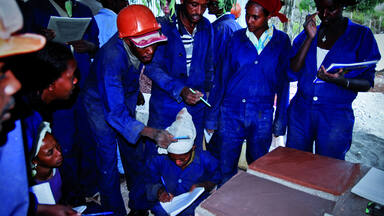African universities supporting the safeguarding of World Heritage
The World Heritage Centre, in close collaboration with the UNESCO Multisectoral and Regional Office in Dakar and the African World Heritage Fund (AWHF), organized a workshop entitled "World Heritage and Institutions of Higher Learning in Africa" from 6 to 8 November 2018 at the University Gaston Berger de Saint-Louis (Senegal), with the support of the Senegalese Ministry of Culture and the Ministry of Higher Education, Research and Innovation.
This workshop was attended by over 60 participants including academics, site managers and African World Heritage experts from 15 French- and Portuguese-speaking countries in Africa. This event marks an important step in the involvement of institutions of higher learning in Africa in the implementation of the World Heritage Convention.
Following the English-speaking workshop held in April 2018 at the Great Zimbabwe University, this event is particularly important for UNESCO as it was the first major French-speaking workshop bringing together heritage professionals, experts and researchers to explore the role universities can play in the management and conservation of World Heritage in Africa. The relevance of such a workshop for specialists was apparent as soon as UNESCO launched the open call for participants, which attracted more than 130 applications (of which 14 from women) from 27 African countries.
Over the course of the three-day workshop, the participants made insightful presentations on a wide range of related topics and engaged in intensive and inspiring discussions on existing curricula and research related to heritage conservation and management in Africa.
Following the fruitful exchanges, the participants recommended:
1. to heritage institutions and institutions of higher learning in Africa to develop curricula on World Heritage, and that they harmonize them with the objectives of the World Heritage Convention and its guidelines concerning the protection of cultural and natural heritage at the national level;
2. to institutions of higher learning in Africa to:
(i) contribute to the development of a database of experts and education and research programmes on heritage in Africa;
(ii) develop practical content on heritage management adapted to the UNESCO World Heritage Education Programme;
(iii) develop an interdisciplinary teaching approach;
(iv) undertake research on indicators to measure the contribution of African cultural and natural heritage to the Sustainable Development Goals; and
(v) contribute to the search for solutions adapted to the problems facing African World Heritage properties in order to improve the production of convincing and informative content on African heritage in an effective and sustainable manner.
The participants also called on African States Parties, the African Union, regional economic communities, UNESCO and other partners to support scientifically, technically and financially the development of a pan-African cooperation between heritage institutions and institutions of higher learning, particularly in connection with UNESCO Chairs, for the establishment of teaching and research activities related to African World Heritage.
Thanks to the workshops in Saint-Louis and Great Zimbabwe, over 60 experts, including 16 women, were selected to constitute a platform for reflection, which is considered crucial to accompany African States Parties. These future reflections will cover numerous issues, including living heritage, cultural industries and development indicators.
This initiative was made possible thanks to the financial support of the Netherlands Funds-in-Trust (NFiT) and the Government of Senegal.


